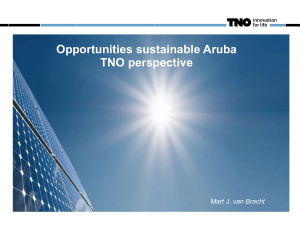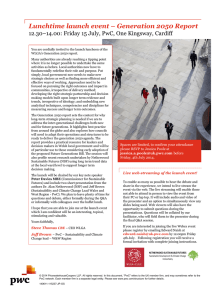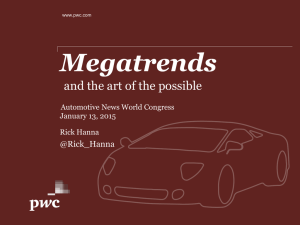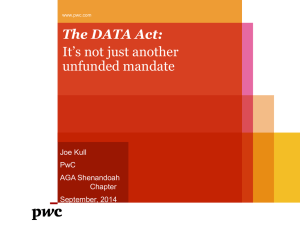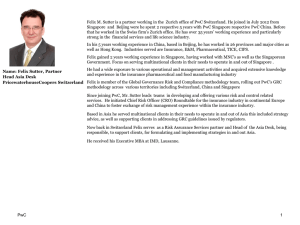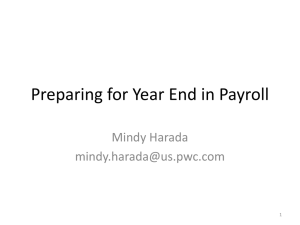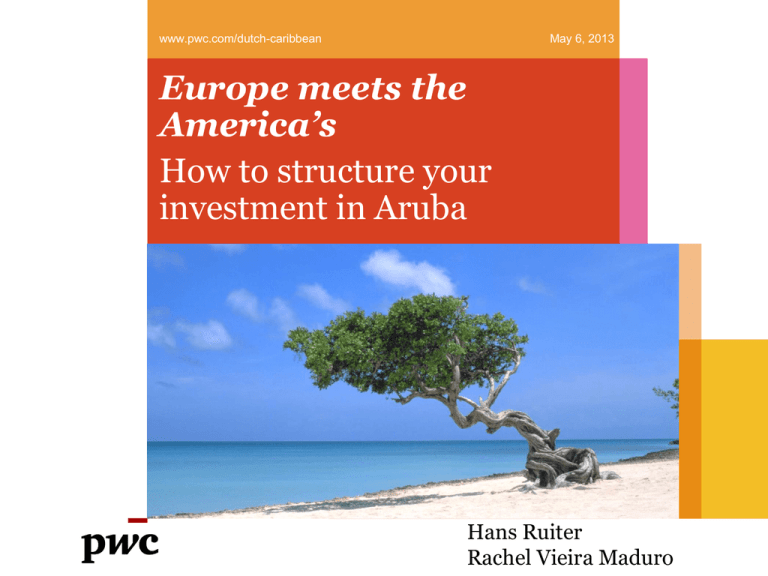
May 6, 2013
www.pwc.com/dutch-caribbean
Europe meets the
America’s
How to structure your
investment in Aruba
Hans Ruiter
Rachel Vieira Maduro
Agenda
Contents
Page
Aruba as a gateway
3
Applicable taxes in Aruba
4
What do we have in Aruba at this moment
5
Proposed legislation in Aruba
6
Possible structures in Aruba
7
Principles sales company
8
Tolling Manufacturing Model
12
Europe meets the America's
PwC
May 6, 2013
2
Aruba as a gateway
Aruba advantageous:
• Geographical location
• Languages
• Politically stable
Other important advantageous:
• OECD white listed
• FATF approved
• Not a tax haven
• Wide range of fiscal products
Europe meets the America's
PwC
May 6, 2013
3
Applicable taxes in Aruba
28% profit tax
10% dividend withholding tax
1.5% turnover tax (VAT/IVA)
(export exempted)
1.3% FEC on payments abroad
Income and wage tax
Europe meets the America's
PwC
May 6, 2013
4
Fiscal regime in Aruba
What do we have in Aruba at this moment
• Normally taxed NV (28%)
• Free Zone Company (2% + 0.75% facility charge)
• IPC regime
- 2% tax for certain activities
• Transparent NV/AVV
- works for business without substance in Aruba like aircraft
registration, however focus is business with substance
• Aruba Exempt Company
- tax exempt for certain (financial) activities
• Participation exemption for foreign investments (active and subject
to tax)
Europe meets the America's
PwC
May 6, 2013
5
Fiscal regime in Aruba
Proposed legislation in Aruba
• Free Zone regime adjusted
- no dividend withholding tax
• Tax Zone San Nicolas
- 2%/10%/15% tax on profit
- no dividend withholding tax
- no FEC
• Expat regulation
- relief on high income tax for
temporary employees from abroad
• IPC regime adjusted
- activities to be further determined
- profit tax rate of 10%/12%/15%
- no dividend withholding tax
Europe meets the America's
PwC
May 6, 2013
6
Possible structures in Aruba
Inbound Investment Structures
• Principal Sales Company
• Tolling Manufacturing Model
Europe meets the America's
PwC
May 6, 2013
7
Possible structures in Aruba
Principal Sales Company
Europe meets the America's
PwC
May 6, 2013
8
Possible structures in Aruba
Principal Sales Company
Objectives
• Concentrate profits in low tax jurisdiction: 2% profit tax, instead of
higher percentage in your country
• Move all of the mayor sales activities and related risks into one
principal sales company in Aruba
• Minimize scope of local foreign representatives
• Language, security, time zone and culture
Europe meets the America's
PwC
May 6, 2013
9
Possible structures in Aruba
Principal Sales Company
The Model
Activities of Principal
NL Production
Company
Aruba
Free-(SN) Z0ne 2%
•
•
•
•
•
Purchase and sale contracts
Inventory management
Price and currency risks
Debtor and credit risks
Obsolete goods
Principal Company
Colombian
Commission
Agent
Colombian Sales
Company
Colombian
Customer
Europe meets the America's
PwC
May 6, 2013
10
Possible structures in Aruba
Principal Sales Company
Aruba Tax Aspects
The Model
NL Production
Company
Aruba
Free-(SN) Z0ne 2%
Principal Company
•
2% profit tax in Free-Zone
•
Turnover tax exemption
•
Expat regulation
Dutch Tax Aspects
•
Participation exemption
Colombian Tax Aspects
•
Colombian
Commission
Agent
Colombian Sales
Company
Limited commission based
remuneration: subject to
33% CIT
Colombian
Customer
Europe meets the America's
PwC
May 6, 2013
11
Possible structures in Aruba
Principal Sales Company
Conditions and Characteristics
•
Organize the model up front for new activities
•
Substance requirements
•
Adequate transfer pricing documentation to prevent double taxation
•
If possible up front tax agreements confirming the transfer pricing
policy, in particular in Principal jurisdiction
•
The Principal jurisdiction: excellent reputation, low tax on profits,
stable tax regime and beneficial expat taxation regulation
Europe meets the America's
PwC
May 6, 2013
12
Possible structures in Aruba
Tolling Manufacturing Model
Europe meets the America's
PwC
May 6, 2013
13
Possible structures in Aruba
Tolling Manufacturing Model
The model
EU Company
Purchase
contracts
Sales
Aruba
Free-(SN) Z0ne 2%
Colombian
Customers
Operator
Tolling Fee
Raw
Material
Input
Europe meets the America's
PwC
Tolling
Agreement
Colombian Production
Plant
Raw
Material
Output
May 6, 2013
14
Possible structures in Aruba
Tolling Manufacturing Model
Aruba Tax – Project
Management
•
2% profit tax in Free-Zone
•
Turnover tax exemption
•
Expat regulation
•
No WHT on tolling fee
Colombian Tax – Project
Company
•
Profit calculated on cost-plus basis
and subject to 33% profit tax
Europe meets the America's
PwC
May 6, 2013
15
Possible structures in Aruba
Tolling Manufacturing Model
Conditions and Characteristic
•
Organize the model up front and for new activities
•
Substance requirements
•
Adequate TP documentation to reflect the services rendered and the
risk and activities performed
•
If possible up front tax agreements confirming the TP policy
Europe meets the America's
PwC
May 6, 2013
16
Sharing knowledge
and creating value…
For more information please contact PwC Aruba:
Hans Ruiter (hans.ruiter@an.pwc.com)
Rachel Vieira Maduro (rachel.m.maduro@an.pwc.com)
This publication has been prepared for general guidance on matters of interest only, and does not constitute professional advice. You should not act upon the
information contained in this publication without obtaining specific professional advice. No representation or warranty (express or implied) is given as to the
accuracy or completeness of the information contained in this publication, and, to the extent permitted by law, PwC Dutch Caribbean, its members, employees
and agents do not accept or assume any liability, responsibility or duty of care for any consequences of you or anyone else acting, or refraining to act, in
reliance on the information contained in this publication or for any decision based on it.
© 2013 PwC Dutch Caribbean. All rights reserved. In this document, “PwC” refers to PwC Dutch Caribbean which is a member firm of PricewaterhouseCoopers
International Limited, each member firm of which is a separate legal entity.



